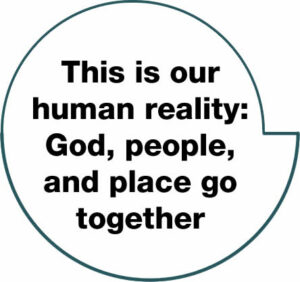God, people, and place are inseparably bound to one another in a relational way.
Ask yourself this question, “Have I ever experienced God separate from people and/or place?”
Our contexts for life consist of the people around us and the places where we engage them. We all have experienced God many times and ways (after all, he is ever-present), and we cannot separate our memory of these experiences from the places we were and the people with whom we were engaged.
This is our human reality: God, people, and place go together.
It makes sense, then, to define the geographical space where we spend most of our time and have the greatest opportunity to engage people for ministry. For most of us, this is our neighborhood. Let’s call this place our Personal Ministry Area (PMA) and take a look at some practical reasons for defining it.
Our Neighbors are of Unsurpassable Worth
Establishing a PMA recognizes that our neighbors are created by God and of unsurpassable worth to Him and, therefore, to us. Because they are worthy of God’s sacrificial love, they are worthy of our love, time, and attention as well. Establishing who our neighbors are creates opportunity to invest in them and to make praying for them by name or address a priority. In other words, by defining a geographical space that constitutes our neighborhood, we define an area for which we are responsible to shepherd spiritually.
Our Neighbors Share Community Experience
Establishing a PMA provides opportunity to make relationships with neighbors with whom we share common community experience. Together, our neighbors and we share the same community problems and are equally a part of the solution.
A hangout I enjoyed in my neighborhood in Minnesota was a coffee shop located a block from my home. This past summer the city of Minneapolis did some major roadwork that significantly inconvenienced several hundred neighborhood residents. Just mentioning the roadwork at 12th and LaSalle began many of the conversations that I had with my neighbors in this coffee shop. Because of our shared inconvenience, we had almost immediate rapport. Why? Because we shared the same space and the same issues inherent within it. Consider for a moment, what is going on in your neighborhood right now (good and bad) that affects nearly everyone who lives there? Such things are immediate conversation starters with your neighbors.
It’s also true that just as people within our personal ministry area share community problems, we also share together the responsibility for solutions to those problems. Our PMA helps us to discover the ways neighbors can work together for the neighborhood’s well-being. The good news is that all neighbors, including ourselves, have something to contribute to their neighborhood’s well-being. The degree to which we ignore a person, family, or group of people is the degree to which our neighborhood’s well-being will be diminished.
Our Neighbors Deserve Our Unbiased Attention
Establishing a Personal Ministry Area commits us to the well-being of every person who lives within its boundaries and combats the tendency to not listen to people and groups we in some way find offensive or with whom we just plain differ. Yes, this happens. I have consulted with churches that do not seek out certain groups of people due to their own stated bias and prejudice. Committing to every person within our PMA helps avoid this.
Our Progress Thus Far
This article has focused on the reasons for defining your neighborhood geographically. The next question is how do we go about doing that. What criteria and tools do we use? Soon I will post on the livelifetogether.com blog step by step “how-to” instructions. Until then – peace in the neighborhood.
For Reflection
- What biblical examples can you recall that shows that human experience with God is inseparable from people, and place.
- Do some prayerful soul searching. Are there people and/or areas in your neighborhood that you avoid because of negative bias? To develop relationships with these neighbors, prayerfully contemplate one thing you can do today to begin melting barriers and initiating reconciliation.
